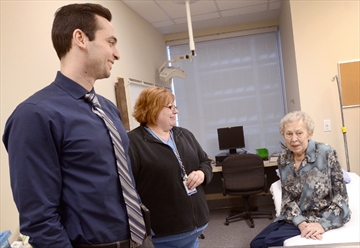Friday, December 12, 2014
Clinic gets Mary to nephew’s wedding despite advanced cancer
Dr. Jacob Gelberg's way of relieving severe breathing problems from fluid build-up in patients with advanced cancer is in some ways helping them get through their bucket lists.
"We don't cure cancer," said Gelberg, who runs a specialized clinic at St. Joseph's Hospital in Hamilton.
"We help patients at the end of their journey to have a quality of life, control of their symptoms and to give them comfort and independence."
The Pleural Spaces Clinic also helps with "their so-called bucket list in that it gives them more time at home with family and friends, which is what most people want," he added.
At the clinic, staff insert small catheters in patients with advanced lung, breast, and ovary cancers, and lymphoma for less frequent and painful draining of built-up fluids some of them experience in the chest cavity.
The tunneled pleural catheter frees up patients from having to carry cumbersome bags collecting the fluid or from often having to spend about 10 days at a time in hospital to drain the fluids. With this catheter, the draining is done at home by visiting nurses.
Stoney Creek lung cancer patient Mary Wiebe, 82, appreciates that.
Her nephew's wedding in Winnipeg was on her bucket list. The pleural catheter works so well she and her husband flew out last month to attend it.
"Just being there was very special," she said. "And it really surprised people that we were able to make it, thanks to these folks (at the clinic)."
Wiebe is one of about 80 patients since the clinic opened in 2013 to get the pleural catheter. She was diagnosed with lung cancer on July 4 and has had the pleural catheter since July 30.
recommended : wedding dress at Australia
The built-up fluid around her lungs, which makes it very difficult to breathe, is drained three times a week at home by a visiting nurse.
"I have no change in my lifestyle" as a result, Wiebe said.
Her husband, Jack, 86, said his wife's pleural catheter has helped them spend more time at home together.
It takes about five minutes to drain the fluid, an accumulation of a half to a litre of fluid each time, Gelberg said. In 50 per cent of patients, the fluids dry up completely after using the pleura catheter, he said.
Patients used to have to be admitted to hospital to have a tube inserted to drain the fluid. "It was quite painful…"
Advanced cancer patients often have less than a year left to live so under the old way, "they'd have to spend significant time in the hospital, which they don't want. They want to be at home with their families."
The pleural catheter gives patients a sense of control over their lives, Gelberg said. "I had a patient who wanted to go for a bike ride with her partner and now was able to do it."
Its use also reduces hospital admissions and stays, making room to shorten wait times for other procedures, he said.
Similar pleural clinics exist in Toronto, Ottawa and Kitchener. The goal is to develop them across Ontario, Gelberg said.
Source : Dresses Online Australia
Labels:
Wedding
Subscribe to:
Post Comments (Atom)

No comments:
Post a Comment